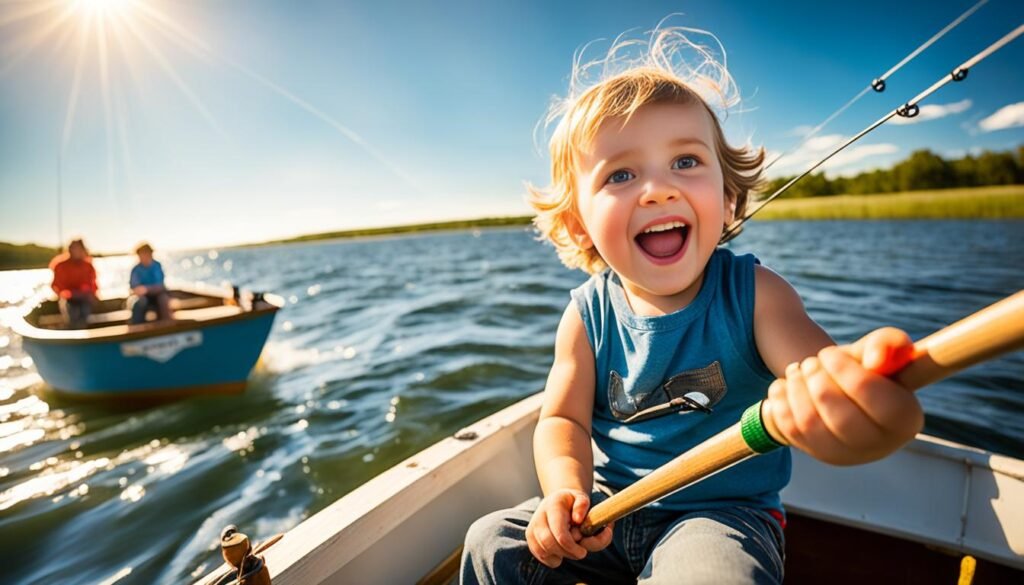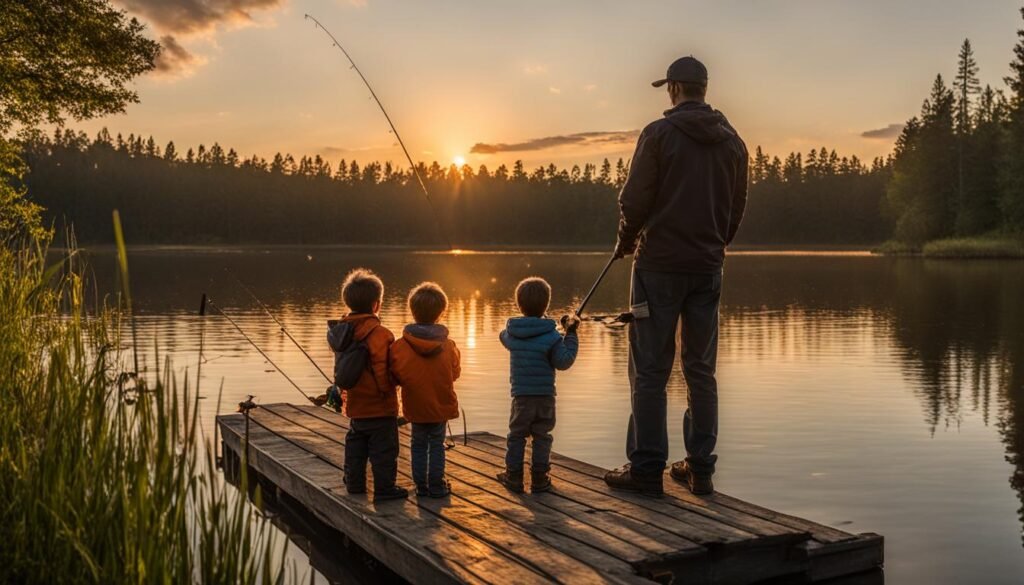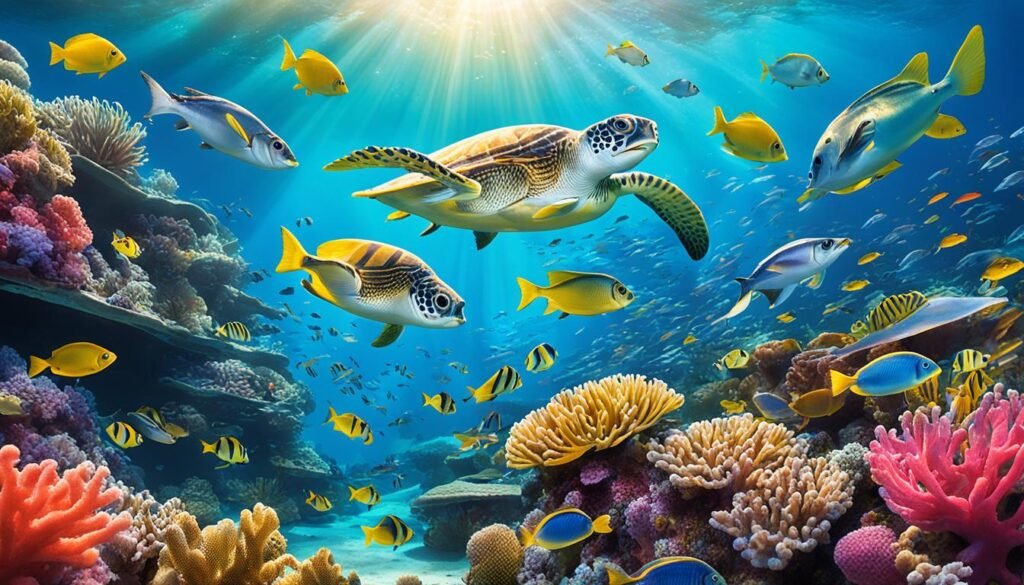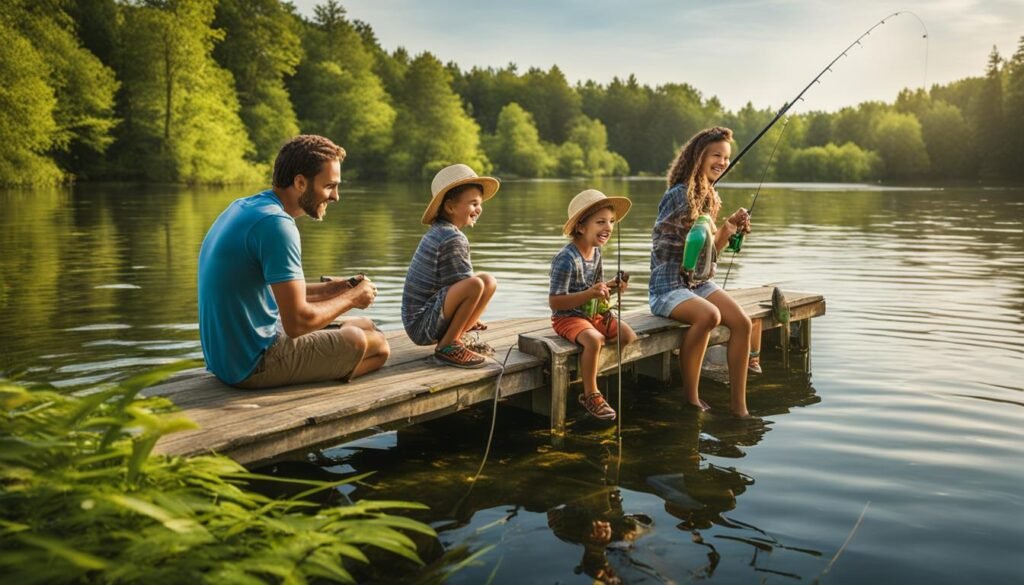“Fishing is much more than fish. It is the great occasion when we may return to the fine simplicity of our forefathers.” – Herbert Hoover
As a fishing enthusiast, I understand the transformative power of time spent on the water. It is an activity that connects us to our roots, providing a peaceful escape from the chaos of modern life. And when it comes to fishing with kids, it goes beyond the simple act of catching fish. It becomes an opportunity to create lifelong memories, bond as a family, and instill a love for nature.
Key Takeaways:
- Exploring “The Angler’s Bookshelf” is a must for every fishing enthusiast, with a wealth of fishing literature to inspire and educate.
- Fishing trips with children foster a deep connection with nature and teach important life skills such as patience and perseverance.
- The excitement of a child’s first catch ignites a lifelong passion for fishing and creates lasting memories.
- Teaching kids the basics of fishing helps them develop essential skills and boosts their confidence and self-reliance.
- Through fishing, children can learn about marine life, ecosystems, and the importance of conservation.
Fishing with Kids: Lifelong Memories on Water
Fishing trips with your children can create lifelong memories and foster a deep connection with nature. These experiences provide an opportunity for kids to learn essential life skills such as patience, focus, and perseverance. They can also develop a sense of accomplishment and share their successes with family and friends. Fishing adventures not only offer a chance to bond as a family but also serve as an interactive classroom, teaching kids about marine life, ecosystems, and the importance of conservation.
When you take your children fishing, you’re introducing them to a world of excitement and wonder. It’s more than just a recreational activity; it’s a chance to teach them about nature, conservation, and teamwork. As they cast their lines and reel in their first catch, they’ll experience the thrill of the chase and the joy of reeling in a fish. These moments create a lasting bond between parent and child, forging memories that will be treasured for years to come.
Family fishing adventures provide a unique opportunity for kids to step away from screens and immerse themselves in the great outdoors. They can explore new environments, observe different species, and gain a firsthand understanding of marine life and ecosystems. Fishing trips become interactive classrooms, teaching children about the importance of environmental stewardship and the need to protect our natural resources.
As a parent, you have the power to ignite a lifelong passion for fishing in your children. By introducing them to the joys of casting a line and reeling in a catch, you’re also teaching them valuable life skills. Fishing requires patience, focus, and problem-solving abilities, all of which contribute to their personal growth and development. It’s an activity that builds resilience and instills a sense of confidence as they learn to navigate the challenges of the water.
| Fishing with Kids: Benefits | Key Takeaways |
|---|---|
| Creating lifelong memories | Building strong family bonds |
| Teaching essential life skills | Developing patience, focus, perseverance |
| Learning about marine life and ecosystems | Understanding the importance of conservation |
| Instilling a love for nature | Encouraging outdoor exploration |
| Fostering teamwork and cooperation | Teaching coordination and collaboration |
Family fishing trips offer a unique opportunity to unplug from technology and reconnect with nature. By spending quality time together on the water, you can strengthen family bonds and create shared experiences that will be cherished for a lifetime. Fishing with your children is not just about catching fish; it’s about creating lasting memories, building character, and nurturing a love for the great outdoors.
The Thrill of the First Catch
Experiencing the joy of landing their first catch is a momentous occasion for children. It is a milestone that introduces them to the exhilaration of fishing and ignites a sense of excitement and wonder.
Imagine the anticipation as they cast their line into the water, patiently waiting for that telltale tug. The excitement builds with each passing moment, and when they finally feel the bite, their heart races with anticipation. The sheer thrill of reeling in a fish all on their own is simply unmatched.
As they bring the fish closer and closer, their eyes light up with delight. The joy that radiates from their smile when they finally land the fish is priceless and fills them with a sense of accomplishment that they will carry with them for a lifetime.
This initial success creates an indelible memory that sparks a lifelong passion for fishing. It becomes the foundation upon which they build their fishing skills and knowledge, propelling them to explore new techniques and seek out new fishing adventures. Each subsequent catch reinforces their love for the sport and the joy of being out on the water.
“It was incredible to see the excitement in my child’s eyes when they caught their first fish. It’s a memory we will cherish forever.”
The Joy of Landing a Fish
The pure joy experienced when landing a fish goes beyond mere words. It is a moment filled with a rush of adrenaline and an overwhelming sense of accomplishment. Witnessing the elation on a child’s face as they hold their catch is a testament to the happiness and pride that comes from a successful fishing endeavor.
Thrill of Reeling in a Catch
Every child who has ever held a fishing rod knows the unparalleled thrill of reeling in a catch. The feel of the line as it tugs against their grip, the rhythm of their winding movements, and the suspense of bringing the fish closer and closer—it all culminates in an unforgettable experience. It is in these moments that children begin to understand the true essence of fishing as they connect with nature and harness their skills in pursuit of their next catch.

| Benefits of the First Catch | Impacts on Children |
|---|---|
| 1. Sparks a lifelong passion for fishing | 1. Cultivates a love for nature and the outdoors |
| 2. Creates lasting memories | 2. Develops patience, focus, and perseverance |
| 3. Builds confidence and self-esteem | 3. Fosters a sense of accomplishment |
| 4. Encourages exploration of new techniques and skills | 4. Promotes bonding with family and friends |
Learning the Basics of Fishing
Fishing is not just about catching fish; it’s also about acquiring essential life skills. Teaching children the basics of fishing is a valuable opportunity to impart lessons in patience, concentration, and problem-solving. By mastering fishing techniques designed for children, such as baiting a hook, casting a line, and reeling in a fish, kids can develop a sense of confidence and self-reliance.
When teaching kids to fish, it’s important to start with the fundamentals. Begin by explaining how to properly bait a hook, showing them how to attach the bait securely. Emphasize the importance of being cautious and handling the hook with care to avoid accidents.
Moving on to casting a line, demonstrate the correct technique and guide them through the process. Encourage them to practice their casting skills, focusing on accuracy and distance. Patience is key during this learning phase, as it may take some time for children to master the art of casting.
Reeling in a fish is both exciting and challenging for children. Teach them the proper way to hold the fishing rod and how to maintain tension on the line as they reel in their catch. Emphasize the importance of staying focused and adjusting their technique as needed to successfully land the fish.
Teaching Kids to Fish: Tips and Techniques
Here are some essential tips and techniques to consider when teaching kids to fish:
- Start with child-friendly equipment: Use fishing gear specifically designed for children, such as lightweight rods and reels that are easy to handle.
- Encourage catch-and-release: Teach children the importance of responsible fishing practices and conservation. Educate them about the benefits of returning fish to the water to ensure the sustainability of fish populations.
- Focus on safety: Teach kids about water safety, including wearing life jackets, being mindful of their surroundings, and always having adult supervision when near bodies of water.
- Make it a fun experience: Create a positive and enjoyable environment during fishing trips. Encourage children to celebrate their accomplishments, whether it’s reeling in a fish or learning a new fishing technique.
Teaching children the basics of fishing is more than just a recreational activity. It’s an opportunity to instill valuable life skills and create lasting memories. By guiding them through the process of baiting a hook, casting a line, and reeling in a fish, parents can not only teach their kids about fishing but also foster patience, concentration, and problem-solving abilities. The joy of a well-earned catch and the sense of accomplishment that comes with it will stay with children long after the fishing trip ends.
Learning the basics of fishing lays the foundation for a lifelong love and appreciation of the sport. It’s about more than just the act of catching fish; it’s about the experiences, skills, and values that fishing imparts. By teaching kids to fish, we equip them with the tools they need to enjoy this rewarding pastime and create treasured memories that will last a lifetime.

Exploring Marine Life and Ecosystems
Fishing trips offer a unique opportunity for children to dive into the mesmerizing world of marine life and gain a deeper understanding of ecosystems. Witnessing different species in their natural habitats allows them to observe behaviors, appreciate the delicate balance of underwater ecosystems, and learn about the interconnectedness of all living organisms.
Through firsthand experiences, children develop a profound connection to nature, fostering a sense of awe and respect for the marine environment. This connection often sparks a curiosity and passion for conservation, motivating them to become dedicated stewards of the oceans and promoting responsible fishing practices.
When children explore marine life and ecosystems during fishing trips, they gain invaluable knowledge that goes beyond textbooks and classroom learning. They witness the interconnected web of life, where each species plays a vital role, and understand the consequences of disrupting this delicate balance. This firsthand exposure to biodiversity deepens their understanding of the intricate relationships and complexities of the natural world.
By immersing themselves in marine environments, children learn about the importance of conserving and safeguarding these fragile ecosystems. They discover the impact of pollution, overfishing, and habitat destruction on marine life, emphasizing the need for sustainable practices and conservation efforts. Understanding the significance of biodiversity and the critical role it plays in the well-being of our planet empowers children to take action and make conscious choices that contribute to a healthier and more sustainable future.
“One of the greatest gifts we can give our children is the opportunity to explore the wonders of marine life and gain a deep appreciation for the ecosystems that sustain it.” – [Author Name]
Through fishing, children become active participants in the exploration and conservation of marine life and ecosystems. This hands-on learning experience creates lasting memories, instilling a lifelong passion for understanding and protecting the natural world.

Bonding and Unplugging in Nature’s Playground
Fishing trips provide a perfect opportunity for families to bond and spend quality time together in nature’s playground. Away from the distractions of technology, families can connect on a deeper level, create shared experiences, and strengthen their relationships.
Fishing encourages children to disconnect from screens, appreciate the beauty of nature, and develop new skills. It’s a great way to unplug and enjoy the simple pleasures of spending time together as a family. Outdoor adventures like fishing not only provide an escape from the digital world but also offer a chance to explore the wonders of the natural environment.
“In the midst of nature, families can truly disconnect from technology and immerse themselves in the present moment,” says Sarah Thompson, a family therapist and outdoor enthusiast.
Spending quality time with family is essential for building strong bonds and creating lasting memories. Fishing trips offer a unique setting for these family bonding activities, allowing everyone to slow down, engage in meaningful conversations, and share in the excitement of each catch. Whether it’s teaching a child how to cast a line or celebrating a successful catch, these moments foster a sense of togetherness and unity.
Disconnecting from technology and immersing oneself in outdoor adventures leads to quality time with family, enhanced communication, and the opportunity to create treasured memories.
| Benefits of Bonding and Unplugging | Family Bonding Activities | Outdoor Adventures |
|---|---|---|
| Strengthens relationships | Shared family fishing trips | Exploring natural habitats |
| Promotes communication | Telling stories and sharing experiences | Hiking and camping |
| Creates lasting memories | Teaching and learning together | Canoeing and kayaking |
By disconnecting from technology and engaging in outdoor adventures, families can strengthen their bonds and create cherished memories that will last a lifetime. Fishing provides a unique opportunity to disconnect from the digital world, reconnect with nature, and enjoy quality time with loved ones.

Explore the beauty of nature together, share in the excitement of each fishing expedition, and foster a love for outdoor activities. It’s time to step away from the screens and dive into the joy of quality time with family in nature’s playground.
Teaching Teamwork and Cooperation
Fishing is not just an individual sport; it also teaches kids the value of teamwork and cooperation. Whether it’s baiting hooks, untangling lines, or cheering each other on during the excitement of a catch, fishing requires coordination and collaboration. These shared experiences strengthen family bonds, promote teamwork, and foster a sense of unity and support among family members.
Coordinating fishing tasks allows children to understand the importance of working together towards a common goal. From dividing responsibilities like preparing the bait, casting the line, and monitoring the fishing rods, each family member’s contribution is essential for a successful fishing trip.
The teamwork involved in fishing fosters effective communication, problem-solving, and trust among family members. Children learn how to communicate their needs and work together to overcome challenges, such as untangling lines or repositioning bait. By listening to each other’s perspectives and ideas, families develop strong bonds and create a supportive environment.
“Fishing is a wonderful activity that teaches kids the value of teamwork and collaboration. As we coordinate our efforts, we not only have a greater chance of catching fish but also deepen our connection as a family.” – Mike Johnson, avid angler and father of two
Moreover, fishing as a team allows family members to celebrate each other’s achievements. When a family member catches a fish, the excitement and joy are shared by all, creating special memories and encouraging a sense of pride and encouragement.
Additionally, fishing offers the perfect opportunity for parents to teach their children about leadership and responsibility. Assigning specific tasks and roles during fishing trips helps children gain confidence in their abilities while also understanding the significance of carrying out their responsibilities.
A strong foundation in teamwork and cooperation built through fishing has a far-reaching impact beyond leisure activities. The skills learned on the water can be applied to various aspects of life and help children navigate social interactions, school projects, and future endeavors.
Fishing Task Coordination Chart
| Fishing Task | Assignee |
|---|---|
| Baiting the hooks | Jacob |
| Casting the line | Emily |
| Monitoring the fishing rods | Olivia |
| Recording the catches | Mike (parent) |
Working together as a team not only enhances the fishing experience but also provides an opportunity for families to build unity, strengthen relationships, and create lifelong memories. Through fishing, parents can teach their children the power of collaboration, laying the foundation for a harmonious, supportive, and connected family dynamic.
Creating Lasting Memories and Stories
Fishing trips create unforgettable experiences and memories that will stay with children throughout their lives. The excitement of reeling in a catch, the laughter shared on the water, and the quiet moments of reflection all contribute to a treasure trove of fishings stories that connect families and evoke nostalgia.
These fishing memories become cherished stories that can be passed down through generations, preserving the essence of unforgettable fishing experiences. The joy of catching that first fish, the satisfaction of learning new skills, and the awe-inspiring beauty of nature are all encapsulated in these tales.
Storytelling is an integral part of fishing culture, allowing families to relive the excitement and emotions of past adventures. These stories not only entertain but also serve as a bond between family members, creating a shared sense of belonging and connection.
Whether around a campfire, at the dinner table, or during family gatherings, recounting fishing stories brings back cherished memories and strengthens the ties that bind. These tales serve as a reminder of the joys and lessons learned on the water, keeping the spirit of fishing alive for generations to come.
Conclusion
Fishing with children is a wonderful way to create lifelong memories and nurture a love for nature. Not only does it provide quality family time, but it also offers numerous benefits for children’s development. By immersing themselves in the joys of fishing, kids learn important life skills such as patience, focus, and perseverance. They also gain a deeper understanding of marine life, ecosystems, and the importance of conservation.
Family traditions are built around fishing trips, where parents can pass down their passion for angling to future generations. These shared experiences on the water create lasting memories and stories that connect families and evoke a sense of belonging. It becomes a time-honored tradition that brings the family together and strengthens their bond.
Furthermore, fishing allows children to disconnect from technology and immerse themselves in the beauty of the natural world. It provides a much-needed break from screens and encourages them to appreciate the simple pleasures of outdoor adventures. Fishing trips serve as an interactive classroom, where kids can explore biodiversity, understand ecosystems, and become stewards of the environment.
In conclusion, fishing with children is more than just a leisure activity. It fosters a lifelong passion for angling, creates lasting memories, and instills essential life skills. By sharing the joys of fishing and connecting with nature, families can create a tradition that not only brings them closer together but also nurtures a love for the environment.
